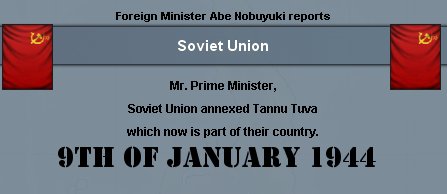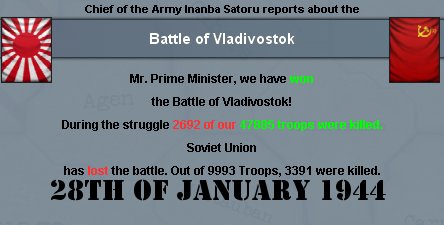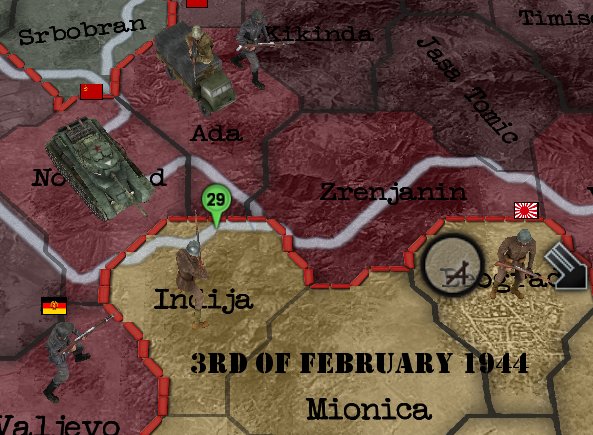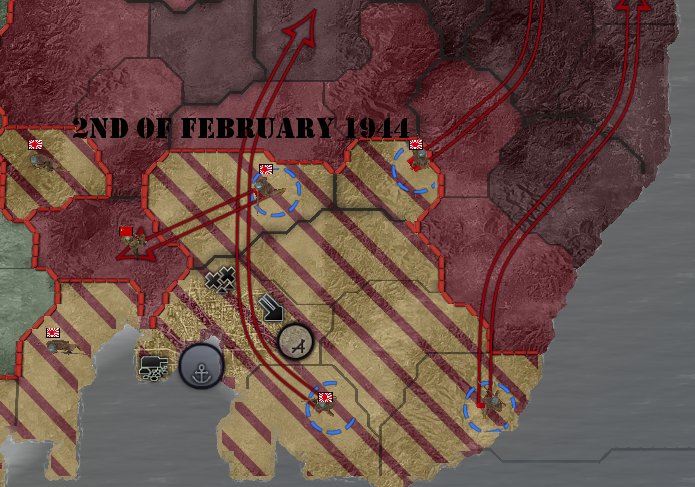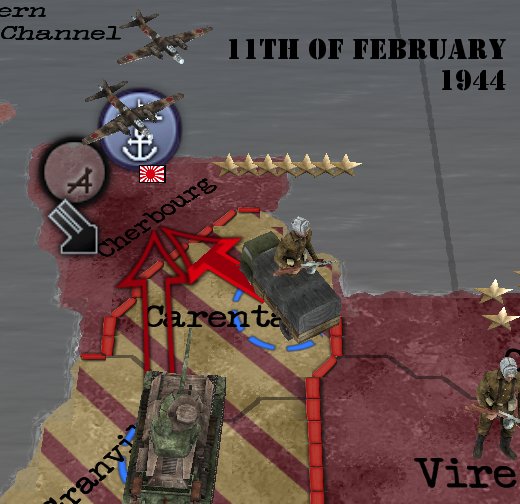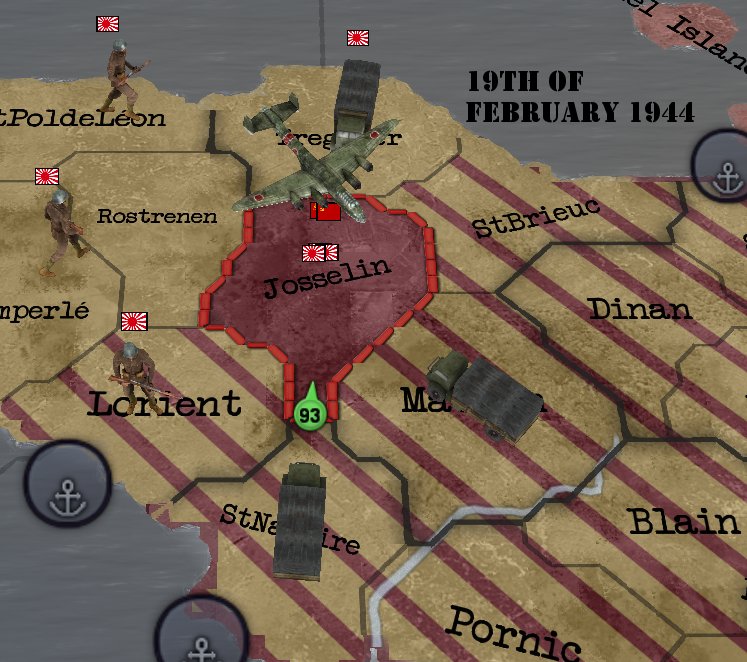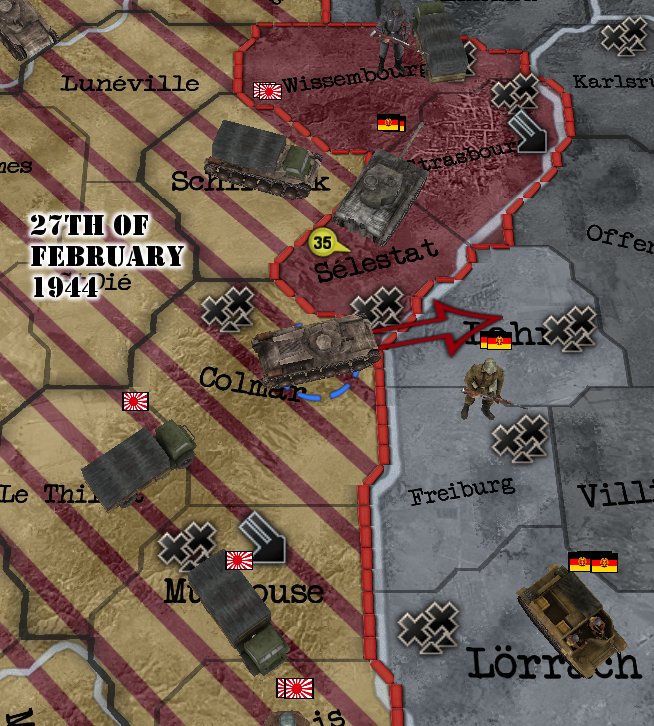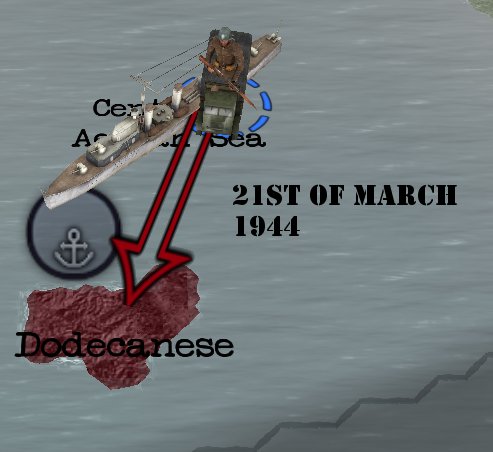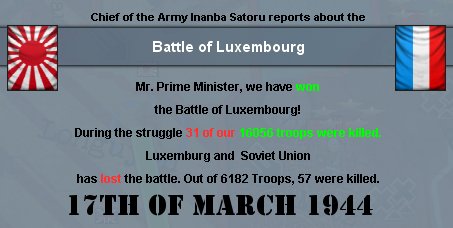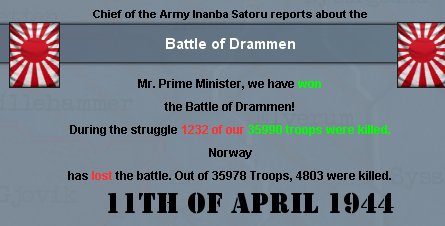Chapter 28
16th of July 1943
The dry, mountainous landscape had much in common with Italy.
The same plants, the same heat…
Yet, the supply-shortages weren’t as difficult as they had been before. And the resistance was also a lot less well-equipped.
The French soldiers fought only sporadically and, most of the day, they were merely fighting the terrain instead of the French.
The government had declared war about 5 days ago.
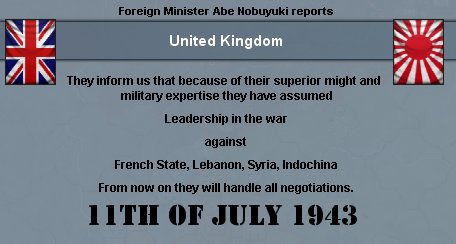
Since then, Japanese marines had taken Tunis from the French, making Marseille their only harbor in the Mediterranean.
Marseille was then occupied a few days after, forcing the remnants of the French fleet out of the Mediterranean and into the arms of the British and Japanese ships waiting for them at Gibraltar and the Suez Channel.
In the mean time, Takumi and his men had reached the outskirts of Lyon.
Lyon was the biggest city in France, thus a victory there might lead to a collapse of the Vichy-Regime.
As the line was pushing forth, four French infantry divisions were encountered.
Their equipment was inferior.
They had set up a defensive position on a hill without any trees.
The binoculars showed Takumi that they had only short-ranged mortars at their disposal, whereas his divisions had highly advanced heavy artillery. Thus, the rest of this encounter is easily told. A huge artillery bombardment of the hill was ordered, while the motorized infantry surrounded the hill to catch any deserters before they could flee. Of course, the firing stopped once Japanese units were in the danger-zone.
In this moment, Takumi really missed the presence of McFarne.
The liaison-officer had been deployed to Paris after the end of the war against the Axis. He could only imagine what he would have said about the French being no-good cowards and wondering why they hadn’t already occupied Vichy France yet.
“Give me a band of fine Scotsmen half the size of your division, and the French will surrender before dinner!”
He grinned.
Well, at least the hill was cleared half an hour later. It offered a large view over Lyon and the Rhone River that was flowing through it.
As his radio-man informed him that the other divisions had already pushed the French beyond the river, he decided to take the last French holdings on that side of the Rhone.
Lyon was occupied by Lunch the next day.
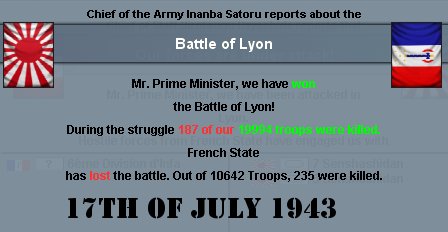
Two days later, Japanese tanks were already besieging Vichy, the capital of Southern France.

Naturally, the town didn’t hold very long and Vichy France surrendered the day after its fall, on the 21st of July.
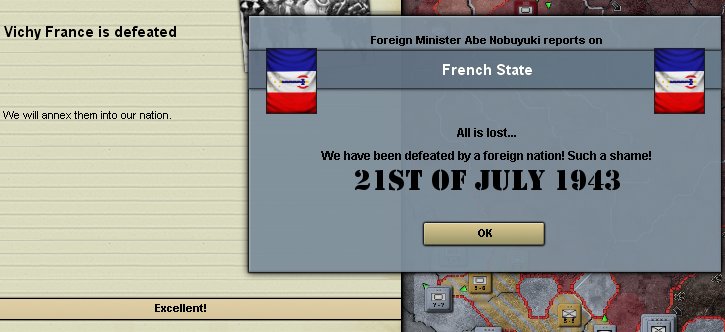
This led to the Japanese holding territories in South America, Northern Africa and elsewhere.
As the Empire didn’t have a real interest in huge colonial holdings that offered only a small amount of resources, small puppet states were established in Tunisia, Madagascar and Morocco.
Just like China, those countries had their own government, but were economically dependent upon the Empire, which could easily sell its products there but didn’t have to bother keeping up public order in the area.
Instead, Japan could concentrate its armies where they were needed.
France had had the same concept, which is why, with the fall of Vichy France, the war wasn’t over yet.
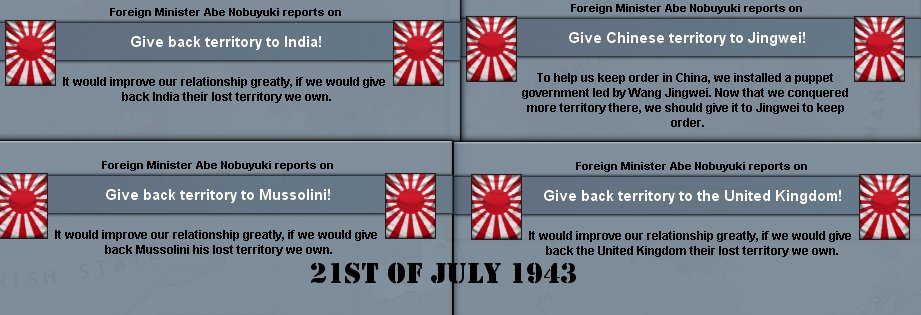
Thus, some territories were also given back to their “ethnic” rulers, such as the numerous French ports in India or the French holdings in Southern China.
This improved the international image of Japan greatly, as it was now a lot less often viewed as a democracy whose lust for conquest was only matched by the Germans. After all, Japan had started some wars against minor nations after the end of the war against fascism.
And those wars are often considered to be led only because of lust for power.
There was still a conflict with Syria, Lebanon and Indo-China.
The two small states in the Mid-East were strategically important to Japan because conquest of those two would grant Japan a connection between the Gulf of Persia and the Eastern Mediterranean.
16 Homengun, the corps that was to defend the western part of the border between Persia and the USSR, was tasked with taking over those two nations.
High Command was well aware that this stripped the border of all defenses, but the Soviets didn’t have any forces there, either. A Soviet assault in the area was therefore considered to be unlikely and the lack of a garrison could therefore be tolerated.
16 Homengun made good progress into Syria, although their speed was limited by the fact that those divisions were all but motorized and the infantry support tanks weren’t constructed for speed.
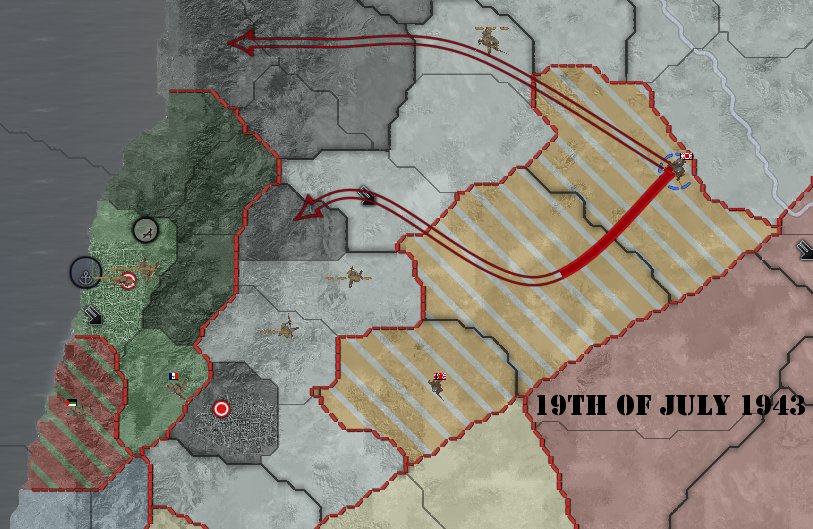
Under the slow yet heavy pressure, Syria surrendered after a week of fighting to the Empire.
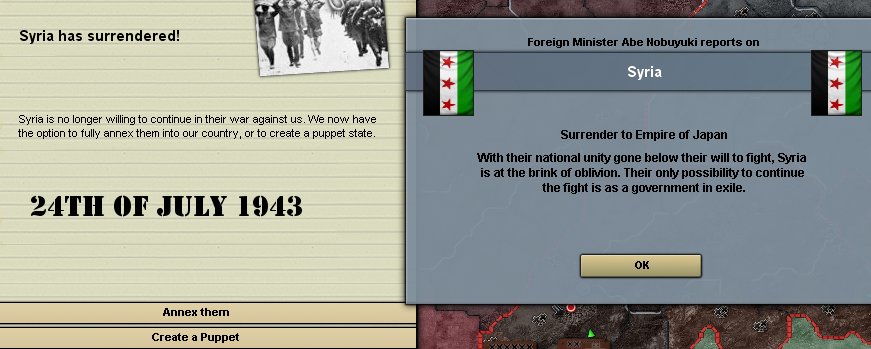
It was decided to make Syria puppet government in order to avoid angering the British by taking over too much territory in the Mid-East.
The slow speed of 16 Homengun was also what pushed back the final assault on Lebanon, which did only start on the 1st of August.
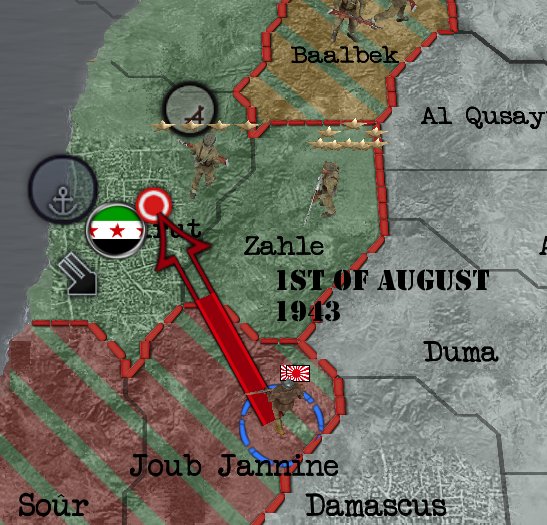
Yet, this didn’t help the Lebanese very much.
They surrendered three days later and were puppeted thereafter.

-----
21st of August 1943
The war against the French had been an unanimous one with no large battles or stalemates.
Haruji was thankful for this, but he had been even more thankful as he heard hios son didn’t have to take part in the fighting.
Even in the combat against a minor enemy, people could still die.
The perfect example for this had been the Japanese war in Indo-China.
Since the declaration of war against Vichy France and its colonies, the Guangxi-Clique had advanced into Indo-China, but had been halted and forced into a stalemate near Hanoi.
As nothing had moved on this front for a month, the Japanese had decided to resolve the stalemate to finally end the war against France.
In public, this was made a huge propaganda-thing, as Japanese marines under protection of the IJN Soryu and its airplanes were moving south to land near the port of Saigon and to occupy it, forcing the Vietnamese defenders to move south and giving the Guangxi the possibility to continue its assault.
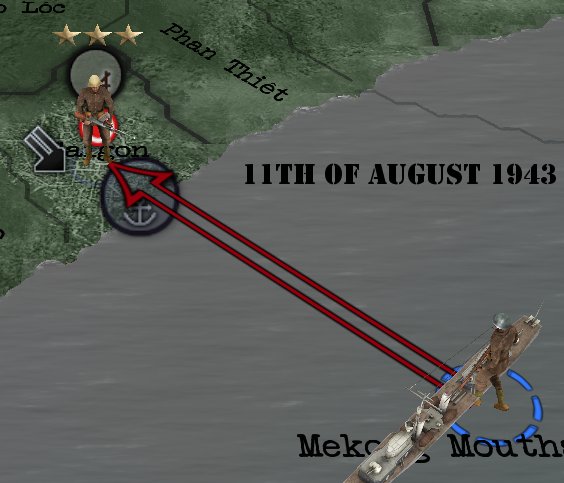
The operation had been launched on the 11th of August and, despite being successful, would become a disaster.
Although the marines outnumbered the defenders, they didn’t manage to establish a beach-head in Saigon itself or the area around it.
The numerous journalists that had been invited by the government to join the invasion to show how “smooth and human” war was these days published several pictures at the home-front, and one was more cruel than the other. As a result, the flow of volunteers for the army declined incredibly, forcing the government to censor the reports about the war.
Yet the idea had worked. The Japanese assault in the south had forced the defenders to move troops to the south and Guangxi forces seized control over Hanoi on the 26th of August.
Indo-China surrendered a day later and was annexed by the Guangxi warlord. The Japanese kept only the port of Saigon and the surrounding area.

But even “success” in this terrible waste of lives and materials left a mark on Haruji. Something inside him had changed at seeing those pictures.
War was no longer only about the heroic tales his father had always told him of the Russo-Japanese war in the 1910’s. Suddenly, it had lost all honorable glimmering and he started to dislike his government for starting such a conflict. He would have been fine with it if this war had been forced upon the Empire from another state, but as the Japanese had unleashed the purging wars themselves, he suddenly found no more tolerance for this inside him.
And huge demonstrations for peace in the streets of Tokyo agreed to him.
Silently he prayed that, with this, war would be over for the rest of his life. Even though he didn’t have to take part in it, he didn’t want to live in a nation that started such conflicts.
The war against the Axis had been ok for him, as, in this war, they had been forced to perform a pre-emptive strike on Nationalist China, which would have attacked them sooner or later, as both nations belonged to different factions and China was luring for control over Manchuria.
Hopefully, there would be no more wars as long as he lived.
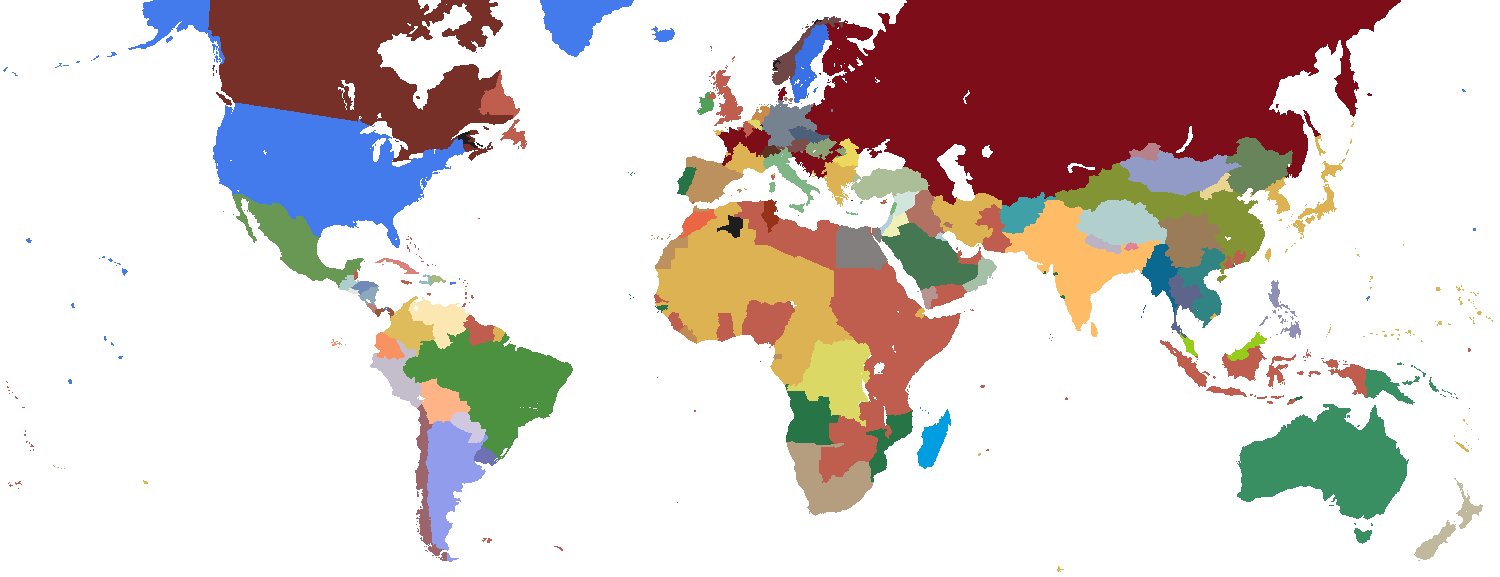
The world after the purging wars.
-----
Author's Note:
AFAIK, unfortunately not. Although it would surely have huge advantages. Luckily, I have large infantry and cavalry forces in the area that don't require fuel. That's something at least.
16th of July 1943
The dry, mountainous landscape had much in common with Italy.
The same plants, the same heat…
Yet, the supply-shortages weren’t as difficult as they had been before. And the resistance was also a lot less well-equipped.
The French soldiers fought only sporadically and, most of the day, they were merely fighting the terrain instead of the French.
The government had declared war about 5 days ago.

Since then, Japanese marines had taken Tunis from the French, making Marseille their only harbor in the Mediterranean.
Marseille was then occupied a few days after, forcing the remnants of the French fleet out of the Mediterranean and into the arms of the British and Japanese ships waiting for them at Gibraltar and the Suez Channel.
In the mean time, Takumi and his men had reached the outskirts of Lyon.
Lyon was the biggest city in France, thus a victory there might lead to a collapse of the Vichy-Regime.
As the line was pushing forth, four French infantry divisions were encountered.
Their equipment was inferior.
They had set up a defensive position on a hill without any trees.
The binoculars showed Takumi that they had only short-ranged mortars at their disposal, whereas his divisions had highly advanced heavy artillery. Thus, the rest of this encounter is easily told. A huge artillery bombardment of the hill was ordered, while the motorized infantry surrounded the hill to catch any deserters before they could flee. Of course, the firing stopped once Japanese units were in the danger-zone.
In this moment, Takumi really missed the presence of McFarne.
The liaison-officer had been deployed to Paris after the end of the war against the Axis. He could only imagine what he would have said about the French being no-good cowards and wondering why they hadn’t already occupied Vichy France yet.
“Give me a band of fine Scotsmen half the size of your division, and the French will surrender before dinner!”
He grinned.
Well, at least the hill was cleared half an hour later. It offered a large view over Lyon and the Rhone River that was flowing through it.
As his radio-man informed him that the other divisions had already pushed the French beyond the river, he decided to take the last French holdings on that side of the Rhone.
Lyon was occupied by Lunch the next day.

Two days later, Japanese tanks were already besieging Vichy, the capital of Southern France.

Naturally, the town didn’t hold very long and Vichy France surrendered the day after its fall, on the 21st of July.

This led to the Japanese holding territories in South America, Northern Africa and elsewhere.
As the Empire didn’t have a real interest in huge colonial holdings that offered only a small amount of resources, small puppet states were established in Tunisia, Madagascar and Morocco.
Just like China, those countries had their own government, but were economically dependent upon the Empire, which could easily sell its products there but didn’t have to bother keeping up public order in the area.
Instead, Japan could concentrate its armies where they were needed.
France had had the same concept, which is why, with the fall of Vichy France, the war wasn’t over yet.

Thus, some territories were also given back to their “ethnic” rulers, such as the numerous French ports in India or the French holdings in Southern China.
This improved the international image of Japan greatly, as it was now a lot less often viewed as a democracy whose lust for conquest was only matched by the Germans. After all, Japan had started some wars against minor nations after the end of the war against fascism.
And those wars are often considered to be led only because of lust for power.
There was still a conflict with Syria, Lebanon and Indo-China.
The two small states in the Mid-East were strategically important to Japan because conquest of those two would grant Japan a connection between the Gulf of Persia and the Eastern Mediterranean.
16 Homengun, the corps that was to defend the western part of the border between Persia and the USSR, was tasked with taking over those two nations.
High Command was well aware that this stripped the border of all defenses, but the Soviets didn’t have any forces there, either. A Soviet assault in the area was therefore considered to be unlikely and the lack of a garrison could therefore be tolerated.
16 Homengun made good progress into Syria, although their speed was limited by the fact that those divisions were all but motorized and the infantry support tanks weren’t constructed for speed.

Under the slow yet heavy pressure, Syria surrendered after a week of fighting to the Empire.

It was decided to make Syria puppet government in order to avoid angering the British by taking over too much territory in the Mid-East.
The slow speed of 16 Homengun was also what pushed back the final assault on Lebanon, which did only start on the 1st of August.

Yet, this didn’t help the Lebanese very much.
They surrendered three days later and were puppeted thereafter.

-----
21st of August 1943
The war against the French had been an unanimous one with no large battles or stalemates.
Haruji was thankful for this, but he had been even more thankful as he heard hios son didn’t have to take part in the fighting.
Even in the combat against a minor enemy, people could still die.
The perfect example for this had been the Japanese war in Indo-China.
Since the declaration of war against Vichy France and its colonies, the Guangxi-Clique had advanced into Indo-China, but had been halted and forced into a stalemate near Hanoi.
As nothing had moved on this front for a month, the Japanese had decided to resolve the stalemate to finally end the war against France.
In public, this was made a huge propaganda-thing, as Japanese marines under protection of the IJN Soryu and its airplanes were moving south to land near the port of Saigon and to occupy it, forcing the Vietnamese defenders to move south and giving the Guangxi the possibility to continue its assault.

The operation had been launched on the 11th of August and, despite being successful, would become a disaster.
Although the marines outnumbered the defenders, they didn’t manage to establish a beach-head in Saigon itself or the area around it.
The numerous journalists that had been invited by the government to join the invasion to show how “smooth and human” war was these days published several pictures at the home-front, and one was more cruel than the other. As a result, the flow of volunteers for the army declined incredibly, forcing the government to censor the reports about the war.
Yet the idea had worked. The Japanese assault in the south had forced the defenders to move troops to the south and Guangxi forces seized control over Hanoi on the 26th of August.
Indo-China surrendered a day later and was annexed by the Guangxi warlord. The Japanese kept only the port of Saigon and the surrounding area.

But even “success” in this terrible waste of lives and materials left a mark on Haruji. Something inside him had changed at seeing those pictures.
War was no longer only about the heroic tales his father had always told him of the Russo-Japanese war in the 1910’s. Suddenly, it had lost all honorable glimmering and he started to dislike his government for starting such a conflict. He would have been fine with it if this war had been forced upon the Empire from another state, but as the Japanese had unleashed the purging wars themselves, he suddenly found no more tolerance for this inside him.
And huge demonstrations for peace in the streets of Tokyo agreed to him.
Silently he prayed that, with this, war would be over for the rest of his life. Even though he didn’t have to take part in it, he didn’t want to live in a nation that started such conflicts.
The war against the Axis had been ok for him, as, in this war, they had been forced to perform a pre-emptive strike on Nationalist China, which would have attacked them sooner or later, as both nations belonged to different factions and China was luring for control over Manchuria.
Hopefully, there would be no more wars as long as he lived.

The world after the purging wars.
-----
Author's Note:
Can you force the Chinese to build better infra in western provinces?
AFAIK, unfortunately not. Although it would surely have huge advantages. Luckily, I have large infantry and cavalry forces in the area that don't require fuel. That's something at least.





